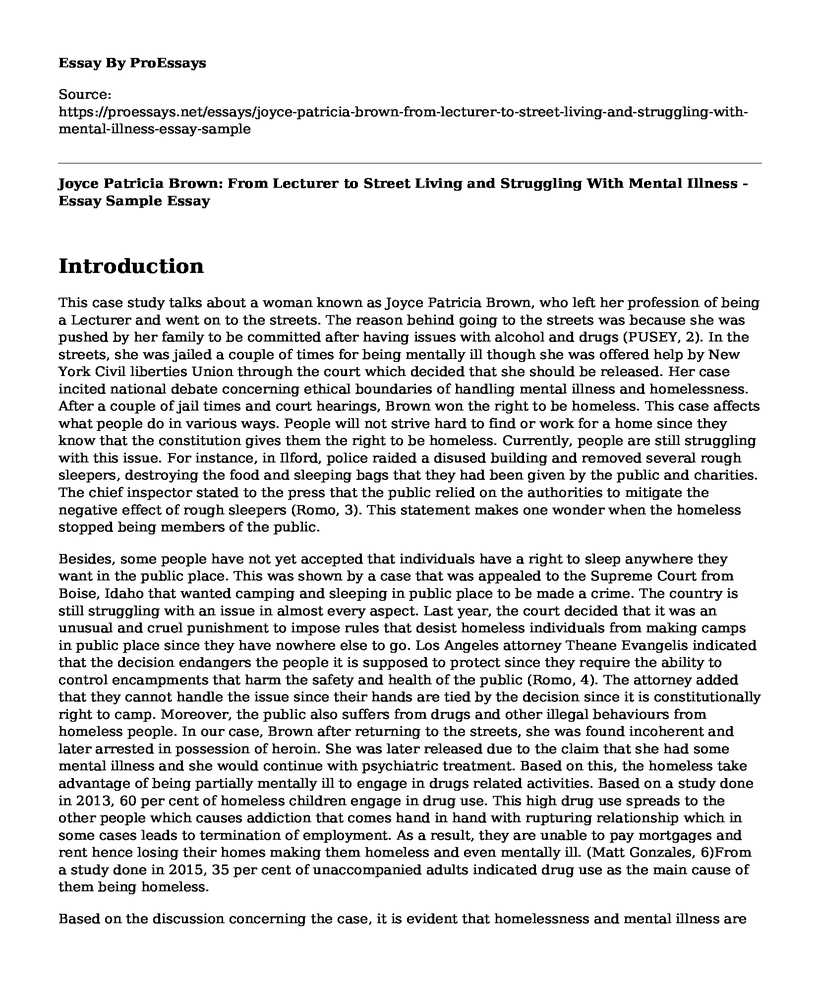Introduction
This case study talks about a woman known as Joyce Patricia Brown, who left her profession of being a Lecturer and went on to the streets. The reason behind going to the streets was because she was pushed by her family to be committed after having issues with alcohol and drugs (PUSEY, 2). In the streets, she was jailed a couple of times for being mentally ill though she was offered help by New York Civil liberties Union through the court which decided that she should be released. Her case incited national debate concerning ethical boundaries of handling mental illness and homelessness. After a couple of jail times and court hearings, Brown won the right to be homeless. This case affects what people do in various ways. People will not strive hard to find or work for a home since they know that the constitution gives them the right to be homeless. Currently, people are still struggling with this issue. For instance, in Ilford, police raided a disused building and removed several rough sleepers, destroying the food and sleeping bags that they had been given by the public and charities. The chief inspector stated to the press that the public relied on the authorities to mitigate the negative effect of rough sleepers (Romo, 3). This statement makes one wonder when the homeless stopped being members of the public.
Besides, some people have not yet accepted that individuals have a right to sleep anywhere they want in the public place. This was shown by a case that was appealed to the Supreme Court from Boise, Idaho that wanted camping and sleeping in public place to be made a crime. The country is still struggling with an issue in almost every aspect. Last year, the court decided that it was an unusual and cruel punishment to impose rules that desist homeless individuals from making camps in public place since they have nowhere else to go. Los Angeles attorney Theane Evangelis indicated that the decision endangers the people it is supposed to protect since they require the ability to control encampments that harm the safety and health of the public (Romo, 4). The attorney added that they cannot handle the issue since their hands are tied by the decision since it is constitutionally right to camp. Moreover, the public also suffers from drugs and other illegal behaviours from homeless people. In our case, Brown after returning to the streets, she was found incoherent and later arrested in possession of heroin. She was later released due to the claim that she had some mental illness and she would continue with psychiatric treatment. Based on this, the homeless take advantage of being partially mentally ill to engage in drugs related activities. Based on a study done in 2013, 60 per cent of homeless children engage in drug use. This high drug use spreads to the other people which causes addiction that comes hand in hand with rupturing relationship which in some cases leads to termination of employment. As a result, they are unable to pay mortgages and rent hence losing their homes making them homeless and even mentally ill. (Matt Gonzales, 6)From a study done in 2015, 35 per cent of unaccompanied adults indicated drug use as the main cause of them being homeless.
Based on the discussion concerning the case, it is evident that homelessness and mental illness are major issues that affect the members of the public. Despite being given the right of being homeless, the case shows that not everyone agrees that they deserve that right. To sum up, the right to be homeless should be upheld, but the authority should be given the power to control them to reduce issues such as drug-related activities.
Works Cited
Matt Gonzales. Homelessness and Substance Abuse. 19 October 2019. <https://www.drugrehab.com/addiction/homelessness/>.
PUSEY, ALLEN. Jan. 19, 1988: Woman wins the right to be homeless. 19 January 2017. <http://www.abajournal.com/magazine/article/joyce_patricia_brown_billie_boggs_1988/>.
Romo, Vanessa. Supreme Court Won't Hear Case On Ban Against Homeless Sleeping In Public Spaces. 16 December 2019. <https://www.npr.org/2019/12/16/788435163/supreme-court-wont-hear-case-to-ticket-homeless-for-sleeping-in-public-spaces>.
Cite this page
Joyce Patricia Brown: From Lecturer to Street Living and Struggling With Mental Illness - Essay Sample. (2023, Apr 07). Retrieved from https://proessays.net/essays/joyce-patricia-brown-from-lecturer-to-street-living-and-struggling-with-mental-illness-essay-sample
If you are the original author of this essay and no longer wish to have it published on the ProEssays website, please click below to request its removal:
- Personality Theory in the Media
- Research Paper on Deviance: Excessive Gambling, Alcoholism & More
- Essay Sample on Deviant Behavior: Exploring Its Causes Using Sociological Theories
- Adolescence: Physical & Cognitive Changes - Essay Sample
- ISTJ: Introverted Thinkers With a Keen Sense of Duty - Essay Sample
- The Lay of the Nightingale - Book Review Sample
- Free Essay Sample on How Social Media Can Affect Women's Mental and Physical Health







